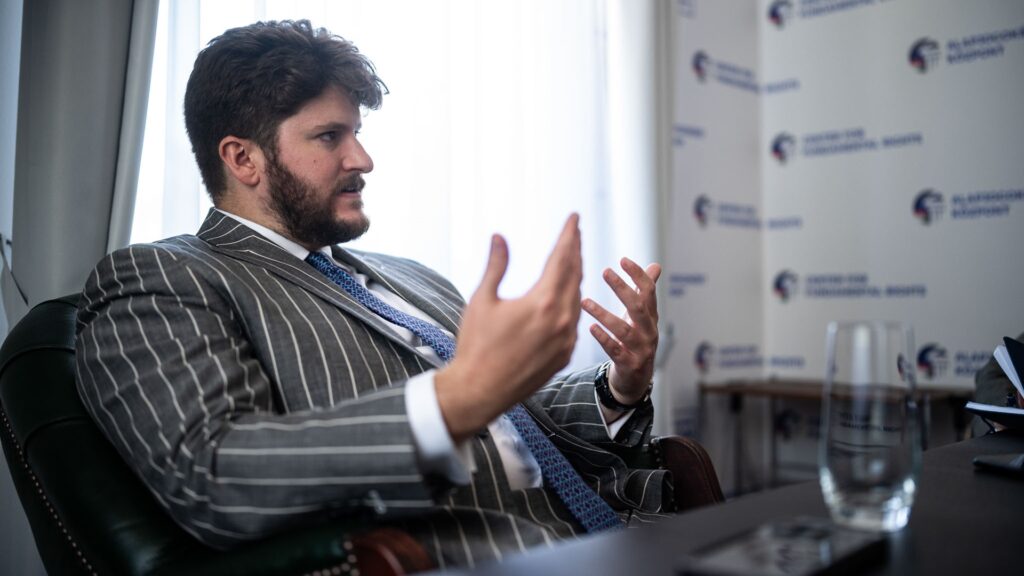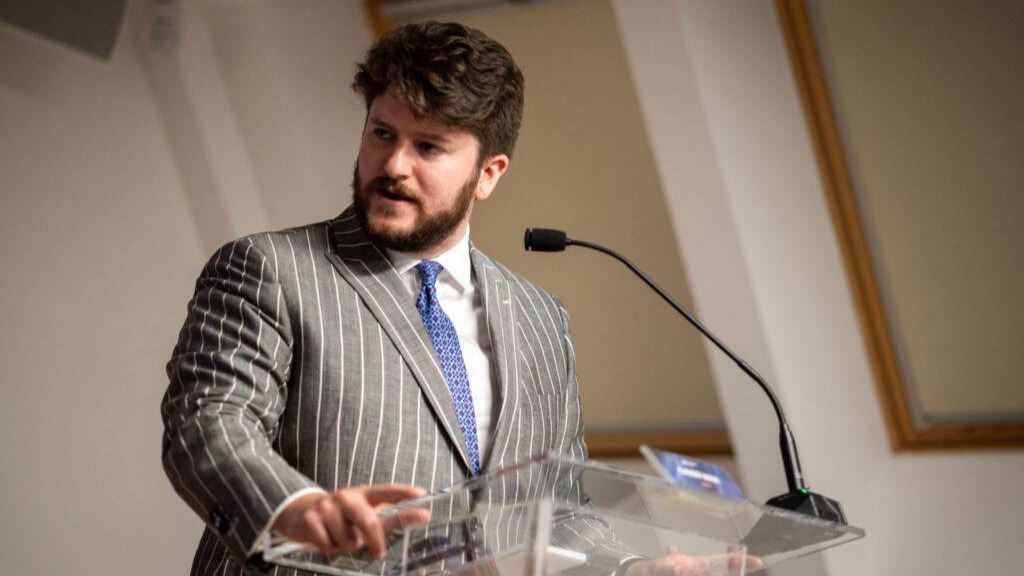Gavin Wax is the 76th president of the New York Young Republican Club, a prestigious organization founded in 1911. He came to Budapest to take part in the announcement of the Wokebusters initiative by the Center for Fundamental Rights. After the press conference he sat down with us for an exclusive interview, in which he discussed the 2024 US presidential election prospects after President Joe Biden dropped out, the close relationship between President Donald Trump and Prime Minister Viktor Orbán of Hungary, and more.
***
The last time we spoke was at CPAC Hungary back in April. It was the time when Donald Trump’s trial was starting in New York, and the public sentiment among pundits, even on the right, was that it was likely to doom his campaign. Joe Biden was closing in on him in the national polling. But a lot has changed since then. Right now, even if there is some fear about Kamala Harris narrowing the gap, it is still a lot, lot better position for Donald Trump to be in than it was even in April. Would you agree?
I think you’re making a very good point, I think you have to have a sense of comparison here. I brought up the same point in my remarks at the press conference: I think it is the peak of her polling. I think she’s plateauing at this level, and then I think she’s going to take a nosedive after the DNC and after her VP pick. I believe the longer she is on the campaign trail, the longer the public is exposed to her, the less enthused people become. I think right now she’s in a honeymoon period. But if you look at her races historically, she is an incredibly weak politician, she is a weak campaigner.
This is a woman who barely won a statewide race in California, running for Attorney General in 2010, in the Obama years. This is an individual who had to basically drop out in embarrassment in the 2020 primaries because she was polling so badly within her own party, barely getting one per cent despite all the money and the support she was receiving. She is very ‘astroturf,’ she is very propped up artificially, and I think ultimately, as time goes on, we’ll see the polls reflect how they were prior to the announcement, and we’re going to see Trump surge once more. I think the lead he has right now is healthy. It’s a lead that he didn’t have in ‘16, that he didn’t have in 2020 either. In ‘16, he won, in 2020, he ‘lost,’ quote, unquote, but at the same time, it was still a very close race, decided by 40,000 votes across three states. So, it’s a very good position to be in, and I think as the campaign kicks off going forward,
once the ticket on the Democrat side is finally solidified, we are going to be in a good position once more.
Of course, we have to remain diligent, we can’t rest on our laurels, but there is a lot of reason to be optimistic.
Also, Kamala Harris is to the left of Joe Biden.
Absolutely, yeah.
So, it’s hard to make the case, I think, that the general public is yearning for a more woke, more progressive candidate than Joe Biden; I don’t think there is any evidence that suggests that.
I agree with you. I think right now there is a lot of excitement for someone replacing Joe Biden because he was so historically loathed by his own party, and by the general populace, so anyone replacing him is going to get a boost. That is what Harris is experiencing right now. But, you mentioned her policies, her ideologies, and the substance of her views: she is the most left-wing candidate on a major party ticket in American history. She is to the left of Obama, she is to the left of the Clintons, she is to the left of everybody. And this is not a left-wing electorate this cycle, this is a cycle where the election is going to be decided by cross-over voters, people who once voted for Obama, then voted for Trump, then voted for Biden, then may vote for Trump again. It’s going to be decided by independents, it’s going to be decided by turnout. And she is going to turn more people off; I think she is going to push a lot of fence-sitters towards President Trump, and she is going to push many people who were still sceptical of Trump, maybe some moderates, maybe some suburbanites, further into his camp. So I don’t see how she grows the tent, I think she only weakens it.
But it’s interesting that in both parties, they are solidifying their ideological trends and directions. President Trump picking JD Vance is a clear sign that they are shifting towards the populist right, and Kamala Harris being coronated as the Democratic nominee is a clear sign that they are shifting even more radically towards the radical left. Again, President Biden was propped up as a candidate representing the return to normalcy. He was the candidate that was supposed to be a return to the American political normal that predated Trump. He was supposed to be ‘Scranton Joe,’ he was supposed to be the blue-collar, Irish Catholic, white working-class guy that you can relate to. He was not running as a left-wing ideologue. Now, obviously, his personnel, and what he’s done in terms of his administration, has been completely different. Kamala, she is the exact opposite: she is left-wing, and she is presenting herself as left-wing. So, we’re going to see how that unfolds.
About your home state of New York specifically: I remember even POLITICO ran a piece, only a few weeks ago, which classified New York as a battleground state, and quoted Democratic operatives on that ground saying that they needed to pour resources into the state. Have you experienced any of that movement in your home state?
Oh, absolutely. I organized President Trump’s historic rally in the Bronx. He was the first Republican candidate ever to host a successful rally attended by tens of thousands of people in one of the bluest areas of the bluest city in one of the bluest states in the country. I mean, you can’t get more left-wing than the Bronx, and he hosted it with 20,000–25,000 people excited to see him. It was an outpour of support from all walks of life. I think that visual alone indicates a trend working in our way. And look, on the ground, I know the local situation in the political sphere in New York, we have the greatest number of Republicans on the City Council in generations. We saw a gubernatorial candidate in Lee Zeldin getting 47 per cent statewide, an unheard of number, in the past gubernatorial cycle. House Republicans were able to reclaim their majority by winning many of the seats in New York.

I think New York is a very important state strategically. It’s a fundraising capital, it’s a media capital, and I think there are many things in New York that are microcosms of the country as a whole. The migrant crisis is on full display, the crime wave is on full display, the attacks on traditional values are on full display. So, a lot of the worst problems are focused in New York, and I think New York also has a litany of positions, not just winning it in the presidential race, but winning congressional seats, winning a greater percentage of the popular vote.
Look, as far as it comes to President Trump: have crazier things happened? Absolutely. I would point to Reagan. Reagan was the last Republican to win the state, primarily because the state had a major third-party candidate. There was a liberal party candidate on the ballot when Reagan won that state, and today, you see RFK Jr on the ballot, you’ll most likely see a Green Party candidate and a Libertarian party one. You’re going to see a hole litany of third-party candidates, which is always detrimental to the incumbent party, which is the Democrats. The Republican party is at a rebound in New York. It’s hit a low point, it’s hit a bottom, and now it’s surging once more.
I think President Trump being a New Yorker, speaking to that sort of Republican populist policy that works in the city, that works in the state, I think he has a better shot than anyone. And there’s been polling, there’s been Siena Research polling that shows him within 10 points—unheard of! He was in the single digits a few months ago. I don’t know if Harris may help the Democrats, I think actually New York may be one of the states where Harris leading the ticket shifts it back to being more blue, we will see when the next polling comes out. But I think it’s definitely great to see that we are expanding the map, we are going on the offensive, and President Trump is venturing where no Republican has ever been before.
President Trump has a strong ally here in Hungary, Prime Minister Viktor Orbán. What are the responses, how does the news media cover it in the US that he has such a strong ally in Europe? Overall, do you think it’s more positive than negative?
Oh, I think it is a huge development, I think Viktor Orbán has become part of the American body politic. He’s widely discussed, and he’s held in very high regard by many American conservatives. They see him as a unique figure, a strong, conservative leader, who wins electoral, governing majorities, and he’s able to effectuate a conservative policy agenda. They see him as a strong ally, not just of the United States, but also, personally of President Donald Trump, and also a strong advocate for peace.
His leadership in driving peace talks, driving a push towards negotiations, shows that he is more of a statesman than anyone on the world stage today,
and it shows that we need more men like Viktor Orbán and Donald Trump in office. I think many American conservatives, many Republicans are getting sick of the war in Ukraine; they’re getting sick of funding it, they’re getting sick of the bloodshed, and the fact that it has no clear objective or goal, or attainable goal, rather. They see the common sense, the realpolitik of Viktor Orbán, trying to bring peace back onto the world stage, which is a position that our own leadership follows. So, I believe the strong friendship and bond on a personal level between President Trump and Prime Minister Orbán is a great asset.
Which is a rare thing, by the way.
A very rare thing. I can’t think of anyone else. You’re a Hungarian, if there is another individual in Hungarian history or politics who had such a public and notable relationship with an American leader, but I’ve never heard of it. Look, I think Hungary is a small country in Central Europe, having a strong leader who, using his personal relationships, can put Hungary at the forefront geopolitically. I think it’s a huge strategic asset. I think Prime Minister Orbán had the foresight to understand that President Trump was still a strong, leading figure.
We were talking downstairs off the cuff about how the last time I saw you, how bad things were in the polling for Trump, how bad things were. Well, Viktor Orbán was one of the few people who saw through all the noise, and recognized that President Trump is a once-in-a-generation political talent. Just because there were periods of momentary doubts about his electoral future, he still recognized that he is the one for the job and that he would be returning to the stage. So, Orbán made a great decision, made a great bet, if you will, and I think it’s going to pay dividends if Trump were to win, both for Viktor Orbán personally, and for the Hungarian people, and all the peoples of Europe, whether they recognize it or not.
Are familiar with, do you study American history?
Yeah, I love American history, yes.
So, probably the closest comparison to this election is 1968, with the incumbent President dropping out. Would you agree?
Yeah, there are a lot of parallels, yes. I’m waiting for the Nixon landslide.
Which came in 1972. But in 1968, it was very narrow in the popular vote, but in the electoral college, it was not so narrow. We also had a former Democrat running as an independent, you had assassination attempts. So you agree that this is the closest comparison to this election, right?
Obviously, it’s not a perfect, one-for-one comparison, but it is certainly one of the closest parallels you can make in recent American political history. I think we were looking to something closer to ‘72, in terms of the electoral successes we could have had had Biden remained on the top of the ticket. I still think that’s a possibility. But, again, we are in a period of political transition right now. The Republican Party is transitioning to something very new, and the Democratic Party is transitioning to something very new. These are processes that happen over decades, over generations, and in many ways, culminating in ‘68. The Nixon coalition that really springboarded him as such a popular President—people really forget how popular of a President he was—that was the same sort of coalition that carried Reagan, it’s the same sort of coalition that is now going to carry Trump. It’s a working-class, America First coalition, it crosses socio-economic divides, it crosses racial lines, it crosses ethnic lines, it’s a very strong and growing emerging populous majority. And I think we are going to see the fruits of that this cycle, and I think President Trump cementing his legacy, starting to cement his succession plans with JD Vance, hopefully can propel that into another eight years if President Trump were to win, so a continuous 12-year cycle of Republican governance. I think we can achieve what FDR achieved when he created the New Deal coalition that really governed the United States as a new political epoch. I believe we can recreate that in a Trumpian, America First, populist manner.
Related articles:








